Islamic Rep. FM Claims Women Have ‘All Necessary Freedoms’ In Iran
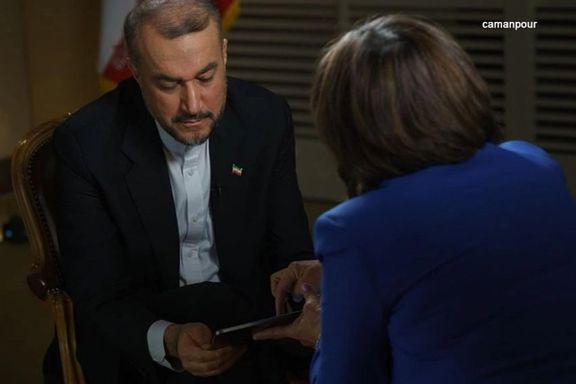
Iran's foreign minister claims that "women in the country have all the necessary freedoms" and that the police "did not kill anyone with a bullet” during the recent protests.

Iran's foreign minister claims that "women in the country have all the necessary freedoms" and that the police "did not kill anyone with a bullet” during the recent protests.
Hossein Amir-Abdollahian made the remarks in a challenging interview with CNN’s Christiane Amanpour, herself of Iranian origin, on Wednesday.
Amanpour conducted the interview without a hijab, in support of Mahsa Amini who died in custody after being arrested for the inappropriate wearing of her hijab. The event sparked mass protests since September, characterized by the slogan, 'woman, life, freedom' as women call for equal rights under the Islamic regime.
More than 500 civilians have since been killed in clashes with security forces with thousands more arrested.
Amanpour raised the issue of the alleged rapes of male and female prisoners at the IRGC detention center, which CNN had verified through its sources. Amir-Abdollahian claimed the reports were "biased and incorrect", stating that he cannot confirm the issue and that there are many such "baseless" claims.
The foreign minister's denial comes as videos of police officers assaulting protesting women in the streets continue to be widely published on social media.
“Women in Iran have all the necessary required freedoms within the framework of the law,” he claimed, calling CNN’s interview was “a confrontation”.
He said: “This is not the way to conduct an interview.”
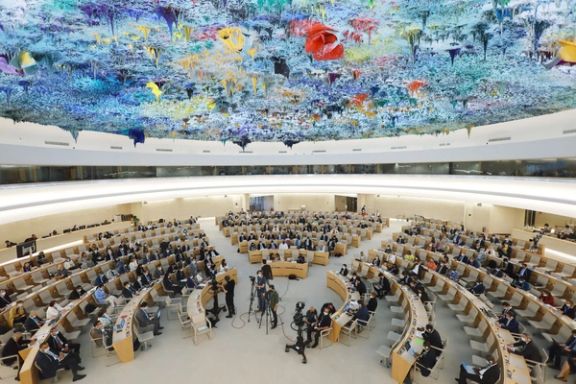
A UN fact-finding mission has called on individuals, groups and organizations to submit information and documentation on the Islamic Republic’s rights violations during ongoing protests.
The mandate was adopted in Resolution S35/1 on the deteriorating situation of human rights in Iran, especially with respect to women and children as well as minorities, in relation to the protests that began in September 2022 after the death in custody of Mahsa Amini.
On November 24, the Human Rights Council decided to establish an independent international fact-finding mission on Iran's deadly repression of protests, which has killed over 500 civilians, until the end of the fifty-fifth session of the Council taking place in March 2024.
The UN mission, in particular, asked for information concerning violent crackdown on peaceful protests by security forces, including alleged arbitrary arrests and detentions, sexual and gender-based violence, excessive use of force, torture and other inhumane treatment and enforced disappearances, as well as the deaths of hundreds of peaceful protesters and thousands of arrests.
The mission is also seeking documentation on physical, psychological and sexual abuse of women and girls for exercising their human rights and fundamental freedoms, and children’s rights violations in relation to the protests, including in raids on schools, and the incarceration of children in ‘psychological centers.'
The call also asked for information on violations of civil society and human rights activists, and reports of charges that carry the death penalty being applied to protesters for offences that are less than the most serious crimes as well as “restrictions on communications affecting landline and mobile telephone usage, including Internet shutdowns and the blocking of social media platforms”.
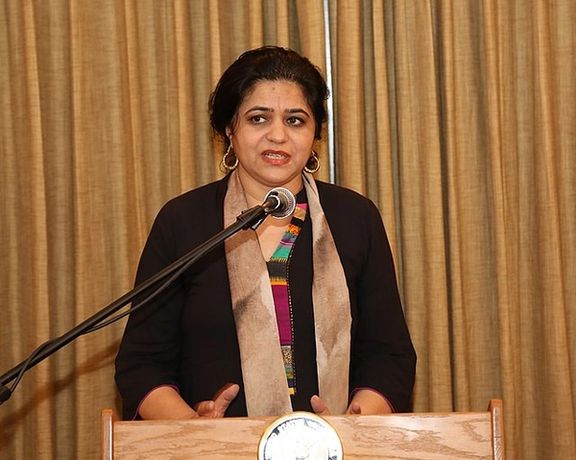
According to the statement issued by the UN Human Rights Council, submissions should be sent as soon as possible, but no later than December 31, 2023, to enable the mission’s Secretariat to process the information, including any follow-up if necessary. Information and documentation can be submitted in English or Persian.
The global outcry against the Islamic Republic’s crackdown on dissent, manifested through a wide array of human rights violations, is getting louder as the opposition forces are uniting and the world seems to be acknowledging the popular uprising. The deteriorating state of human rights in Iran, particularly unlawful executions and chemical attacks on schoolgirls, on the backdrop of worsening economic conditions, workers’ strikes, and devaluation of national currency rial has led to new moves by the international community.
In addition to Europe mulling over designating the Revolutionary Guards – IRGC – as a terrorist organization, US lawmakers are pushing for additional sanctions on Islamic Republic’s parliament. Packed with hardliners, the body provides the legal framework for Tehran’s security forces to murder, torture, and imprison dissidents, US lawmakers say as a bipartisan coalition is pressuring the Biden administration to sanction nearly all of its members amid the government’s crackdown on anti-regime protesters.
Pushing for sanctions on 227 out of 290 members of Iran’s parliament, a group of 26 US representatives and senators from both parties said that "the Islamic Republic of Iran lacks democratic legitimacy, and the members of its parliament are not true democratic representatives of the Iranian people."
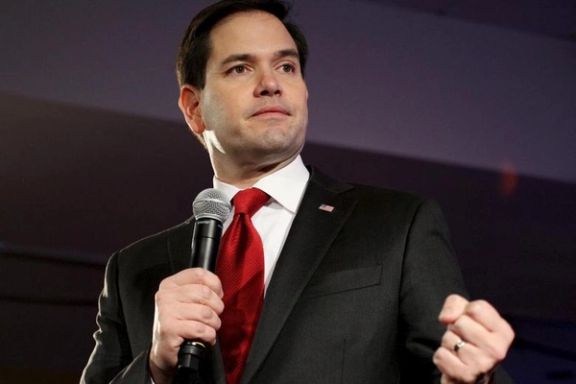
Led by Representative Claudia Tenney (R, NY) and Senator Marco Rubio (R, Fla), the group sent a letter to the State and Treasury Departments. "We urge you to take further actions—and encourage international partners to join us -- to impose much clearer costs on the Iranian regime for the execution of protesters."
On Wednesday, State Department spokesperson Ned Price expressed Washington’s unequivocal determination to hold the Islamic Republic authorities accountable for their actions, saying “we are using every authority we have at our disposal to pursue those who are responsible for the atrocious human rights abuses that the Iranian regime has perpetrated against its own people since September of last year.”
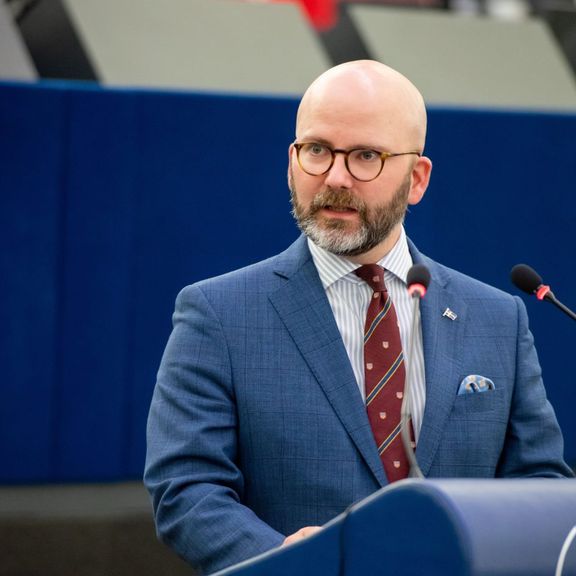
Charlie Weimers, a member of the European Parliament, has said that the EU should create a fund to support Iran's strikes by the blocked Iranian assets.
“One point that I will take to my fellow legislators is the need to support the Iranian labor movement. Many Iranian workers are struggling under almost slave-like situations in IRGC-owned entities… and we need to support them in some way by a strike fund,” stated Weimers.
He was speaking at a press conference with Iran’s exiled Prince Reza Pahlavi, who has been touring Europe to mobilize support for Iran protests.
He further noted that “we have an opportunity to seize the assets of the IRGC abroad…to create a strike fund for Iranian workers to enable the Iranian people to put an end to this regime.”
Weimers went on to say that European leaders should invite Iranian opposition to meet with them to recognize the Iranian opposition and to recognize that there are concrete plans for a transition to a democratic free Iran.
As the protests and calls for strikes continue in Iran, Prince Reza Pahlavi has repeatedly asked the US and the West to form a fund to support the families of the workers who are on strike.
Reza Pahlavi has repeatedly emphasized that the nationwide strikes along with protests will overthrow the Islamic Republic.
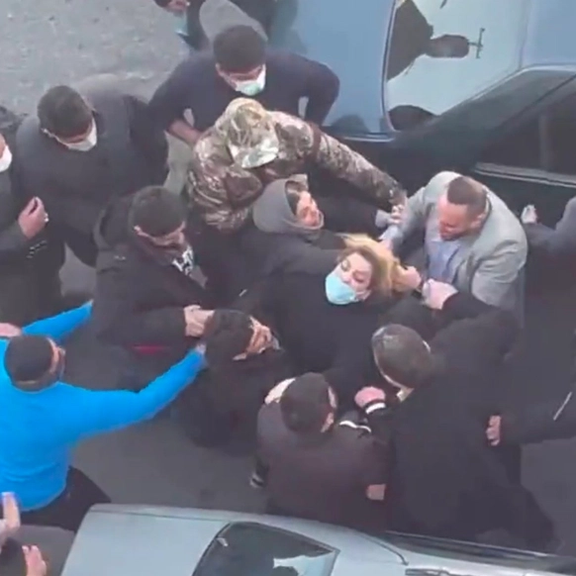
After the worst single day of gas poisonings in Iranian girls' schools, Washington has declared the issue “abhorrent" and called on authorities to put an end to the horror.
On Wednesday, almost 30 schools around the country saw hundreds of schoolgirls become the latest victims of an unknown gas being used in schools apparently to suppress support for the revolution.
In a briefing on Wednesday, State Department Spokesman Ned Price said the reports on the poisonings are both “disturbing” and “concerning”.
Hundreds of schoolgirls - who have been at the forefront of anti-regime protests - have been hospitalized in various cities across the country since November 30 when the first case of a mysterious poisoning was reported in the religious city of Qom.
Price called on the Iranian authorities to thoroughly investigate the poisonings. “It is incumbent on Iranian authorities to respond … [and] put an end to these reported attacks … [and] to hold accountable those who may be perpetrating this,” added Price.
He added: “Women and girls everywhere have an innate right to an education, and education is a universal human right. It is a right that women and girls in Iran should have … It is essential to advancing women’s economic security and to realizing gender equality.”
Interior Minister Ahmad Vahidi, a man wanted by Interpol for the bombing of a Jewish cultural center in Buenos Aires in 1994, said Wednesday that no chemical agent responsible for the poisonings has been found, and the culprits are yet to be apprehended.
He failed to address claims on social media that women dressed in strange attire had been seen walking into school campuses, suggesting a clear campaign to target the schools coming from regime officials.

Exiled Prince Reza Pahlavi delivered a speech Wednesday and answered questions about post-Islamic Republic Iran at the European Parliament in Belgium.
Pahlavi, who has been very active in recent weeks advocating the “revolution in Iran,” was hosted by the Swedish Member of the European Parliament Charlie Weimers and Czech MEP Tomáš Zdechovský. His visit to Belgium is the latest leg of his European tour packed with meetings aimed at garnering support for the newly formed Iranian democratic opposition and pushing for sanctions against the Revolutionary Guards – the IRGC.
His speech was focused on how European countries will benefit from a regime change in Iran along with the Iranian people themselves. He elaborated on the economic benefits that a democratic Iran would herald for Europe in addition to security issues. Mentioning some terrorist activities in Europe by the Iranian regime he called on the MEPs to help further isolate “the regime that occupies” Iran, and expand their support for the Iranian people.
The United States and European countries have sharply criticized the Islamic Republic for its deadly crackdown on protests, but only the US has sanctioned the IRGC, while Europe still hesitates.
He highlighted that the Islamic Revolution of 1978 was never meant to be confined to Iran’s borders by its authors, adding that many leaders of the Islamic Republic, especially its founder Rouhollah Khomeini, do not see Iran as a nation but a vessel to export the Islamic Revolution.
He said now that different opposition voices have united in an unprecedented fashion to oust the regime, it is time for Western democracies to engage with and support the Iranian people.
Pahlavi said that support from European countries also benefits Europe and the wider Western world “because the movement for freedom and democracy in Iran carries the promise of a brighter, safer and more prosperous future for all democratic nations.”
Pahlavi went on to enumerate the threats posed against European countries by the Islamic Republic, describing its military support for the Russian invasion of Ukraine as the latest example. “The Islamic Republic is the only government outside Europe to be actively aiding and abetting Russia’s invasion through provision of military equipment,” he reminded the parliamentarians.
Emphasizing that he would never support a foreign war against Iran, Pahlavi said that “this regime is waging war against Europe, against its land, people and culture, just as it has waged war against my country since its inception. That is why it is of utmost importance that the European Union confronts this regime and holds it accountable for its criminal behavior.”
He said designating the IRGC as a terrorist organization by the European Union is the first step that “would limit meaningfully the regime’s ability to oppress Iranian people and terrorize yours.”
He said that Iran will become an ally of Europe and the Western world after the Islamic Republic, and assured Europe that a vacuum of power would not happen after the fall of the regime. “Iranian people have the talent and the will, the technical experts, the political forces and the national unity to manage a transition from this regime to a secular democracy,” he boasted.
He continued that the path towards establishing a secular democracy in Iran begins with acknowledging “two fundamental truths: that the Islamic Republic poses an existential threat to Iran and its people and that the Islamic Republic cannot be reformed.”
Stressing the necessity of overthrowing the regime in the shortest possible time, he underlined that Europe's support for the protesters in Iran “can significantly reduce the time and the cost of their brave struggle.” The people are the true sovereigns of Iran, not the Islamic Republic, he said, asking the European countries to recognize their struggle. “May light triumph over darkness,” he concluded and received a standing ovation from the MEPs.
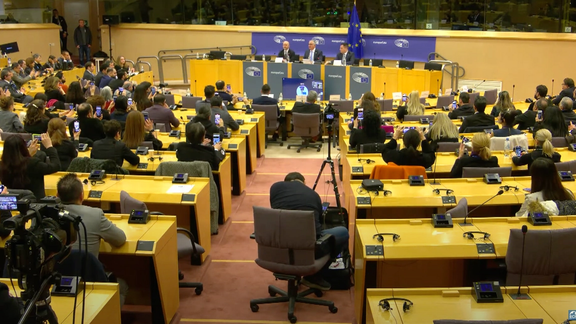
He also answered several questions by the representatives, some with Iranian heritage, about the future of Iran. “How could you possibly get an answer to a problem by talking to the people who are part of the problem?” he quipped in response to a question about the hesitation by those who opt to appease the regime in fear of the consequences.
Answering a question about the nuclear deal and the future of nuclear weapons, he pointed out that the problem is not the gun but the finger on the trigger. He said it is the nature of this regime that cannot be trusted regardless of what document they sign. He emphasized that decision about the country’s nuclear program would be taken by the future government of Iran.
In a historic joint event in Washington on February 10, eight prominent opposition figures held a forum, signaling the emergence of a leadership council in the diaspora to campaign for international support in favor of Iran’s protest movement. They also called for support from democratic countries to change the regime in Iran and establish democracy.
Earlier in the month, more than 20,000 Iranians held a protest rally outside the European Council in the Belgian capital, to call on the European Union countries to designate the IRGC as a terrorist organization. Thousands of Iranians from all over Europe held a massive rally in Strasbourg in January to pressure the European countries to list the IRGC.
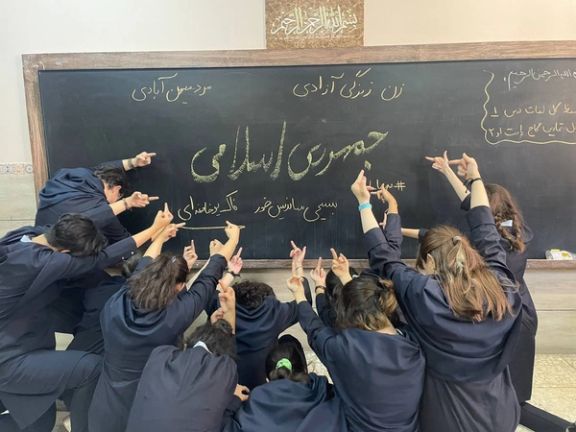
No one has been arrested three months after the first chemical attack on a girls’ school in Iran, amid a new spate of attacks affecting at least 26 schools Wednesday.
Interior Minister Ahmad Vahidi said at a press briefing Wednesday afternoon that so far no one has been arrested for the mysterious poisoning of girls at schools across the country and no chemical agent responsible for the poisonings has yet been found.
The IRGC-linked Fars News Agency had reported the arrest of three individuals earlier on Wednesday.
Vahidi who was assigned by President Ebrahim Raisi at the cabinet meeting Wednesday morning to urgently investigate the incidents also denied that the poisonings, apparently by toxic gases, have caused paralysis in any of the students. He claimed that the symptoms in over 90 percent of the students were induced by stress.

On Wednesday at least 26 more schools were attacked including over a dozen in the capital Tehran, six in Ardabil, two in Kermanshah, and one in Esfahan. In several cases security forces and police used violence against outraged parents who chanted slogans against authorities outside schools.
It is shocking for the public that the government has so far made no arrests or identified suspects, as well as providing extra security around schools. Later on on Wednesday, the United States urged Iran to investigate the poison attacks, a US State Department spokesperson said.
In a tweet Wednesday, prominent journalist Abbas Abdi said the attacks would have already ended if authorities had been as vehement to catch those responsible for the attacks as they are in silencing the poisoned girls’ families.
Children’s parents shouting “Death to the child-killing regime” and “Death to the Dictator” outside a girls’ school in Tehransar in a western suburb of Tehran.
Hundreds of schoolgirls have been hospitalized in various cities across the country since November 30 when the first case of a mysterious poisoning was reported in the religious city of Qom. Attacks have been widespread in Qom and Boroujerd in western Iran so far where tens of schools have been affected. The first attack in Tehran was reported Tuesday. Boys’ schools were attacked only in a few rare cases, including a primary school in Parand Town in the south of the capital, on Wednesday.
Authorities who at first dismissed the reports of poisonings in Qom and attributed the incidents to “children’s pranks” or other reasons including faulty heating, have now admitted that at least 1,200 students were affected by the mysterious fumes.
As many Iranians have said on social media that the attacks are the work of religious zealots who want to prevent girls from attending school, hardliners have tried to blame regime opponents.
Tehran municipality’s Hamshahri newspaper, a hardliner mouthpiece, dubbed the poisoning incidents “A Poisonous Project” and suggestively printed images of opposition figures including the former crown prince Reza Pahlavi, Mujahedin-e Khalq (MEK) leader Maryam Rajavi, and activist Masih Alinejad on its frontpage Wednesday. “By using the students’ poisonings, anti-revolutionaries are trying to cause anxiety among people,” the newspaper wrote.
Schoolgirls at a Tehran hospital Wednesday suffering from short breath and other symptoms including lethargy.
Prince Reza Pahlavi in a tweet Tuesday accused the regime of responsibility for systematic attacks on girls’ schools. Alinejad has also accused the regime and said it is taking revenge on schoolgirls for their participation in the Woman, Life, Freedom protests.
Many parents say on social media that they will not send their girls to school to keep them out of harm’s way but Alinejad has called on male students to boycott classes in their schools and universities on Saturday in support of schoolgirls.
State media and hardliners blame the MEK, which has a long record of terrorist attacks in Iran in the 1980s, more often than anyone else. “I have no doubt that the MEK or other hostile and anti-revolutionary groups are involved [in the poisonings],” lawmaker Ahmad Rastineh said Wednesday.
Another lawmaker, Mohammad-Tala Mazloumi, also blamed the MEK and similar groups, which he said aim to disgrace the Islamic Republic and its educational system, while also pointing a finger at Israel.